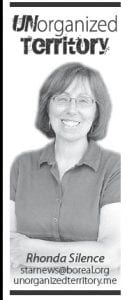I hope that the Cook County commissioners don’t feel that I am picking on them. The county board seems to have been the topic of more than a few Unorganized Territory columns in the last few months. It’s just that the county board is the focus of a lot of activity recently. There has been a lot of scrutiny of the ongoing budget discussions. The commissioners, like most people, don’t want to see property taxes go up. However, commissioners, unlike some constituents, also don’t want to cut county services. That is what makes the budget process so excruciating.
The first budget meetings back in April were spent talking to department heads about needs and wants. The initial round of budget discussion resulted in a shocking 28 percent levy increase. Needless to say, commissioners asked county staffers to sharpen their pencils and find ways to reduce operating expenses.
There was some success. Many budget meetings later, on September 22 the board set its maximum levy at $7,280,870, a 12 percent levy increase over 2015.
Keeping the levy increase at just 12 percent is more impressive than it sounds, as the county board didn’t dip into the county’s fund balance to get there. It is a very good thing for taxpayers, that Cook County has a healthy fund balance. Those “rainy day” funds mean a lot when the county seeks bonding for big projects like road repairs and bridge replacements. It also helps when we go to our legislators seeking state funding for things like Grand Marais harbor improvements or the Poplar River Water District pipeline. Having a solid fund balance shows that our county is fiscally responsible.
However, that sensible, long-term strategy doesn’t mean much to someone whose taxes are going up. Granted, for many the increase is not that drastic. County Auditor Braidy Powers, the county’s numbers man, estimates that the cost to taxpayers with the proposed 12 percent levy increase to be $48 per $100,000 of property value.
That doesn’t sound like a lot. It’s about what you’d pay in gas on a trip to Duluth, for a family dinner at a nice restaurant or for a new winter coat. But for the families in the community that aren’t traveling to Duluth or dining out, but instead barely keeping their heads above water, that “minor” increase is a lot. For the people who are maxing out their credit cards to buy groceries or relying on the food shelf to get from payday to payday, that minor increase is major.
Commissioners, recognizing that non-mandated services such as arts, historical, youth and elder offerings, are important but not essential compared to roads and bridges, law enforcement, and public health services, attempted to trim that discretionary spending.
Commissioners agreed to develop a process that would take the emotion out of distributing funds for nonprofit organizations. An application form was created and nonprofits dutifully completed the form with funding requests. Those requests totaled more than $1 million, including the airport and other county-owned enterprises.
Requests from organizations offering non-mandated services totaled $260,673 and commissioners faced the difficult task of using their criteria to determine what entities would be fully funded and which would not receive their full request.
Despite the good intentions, the matrix for evaluating nonprofits ended up not being as helpful as hoped. As the board worked to trim discretionary donations, there were just too many exceptions. Some nonprofits had successfully built their fund balance—should they be penalized for their fiscal responsibility and asked to dip into their rainy day funds? Others have muddled along without county funding for a year or two but now need some help—should they be funded over another organization that had asked for money several years in a row? Should nonprofits be granted a onetime increase for worthy capital improvement projects? What has more value, a program to benefit our community’s youth or an organization that brings cultural tourism to the county?
No matter how hard commissioners tried to keep emotions out of the equation, well-presented appeals held some sway. Personal preferences and loyalty to constituents can’t be completely eliminated from the budgeting process.
At the last county board meeting on Tuesday, November 10, commissioners trimmed the budgeted amount for non-mandated services a bit more, bringing the total to be granted to nonprofits to $220,000. That hurt some of our community nonprofits.
But it did reduce the levy by a fraction. An increase of 11.2 percent is now anticipated. The increase still hurts some of our community members, but it’s better than it was. Commissioners pledged to keep fine-tuning the budget until the final deadline on December 28.
I wish them luck.
A politician needs the ability
to foretell what is going to
happen tomorrow, next week,
next month, and next year. And
to have the ability afterwards
to explain why it didn’t happen.
Sir Winston Churchill



Loading Comments